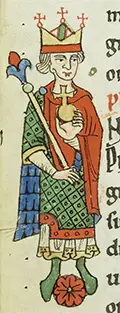Philip of Swabia: King of Germany
Philip of Swabia was King of Germany for a decade into the early 13th Century, at a time when another powerful noble also claimed the title. 
Philip was born in February or March 1177 in Pavia, Italy. His father was the famous Frederick Barbarossa, and his mother was Beatrice of Burgundy. Philip was not his parents' first son; Henry was 12 when Philip was born. As the oldest son, Henry was the heir apparent and so was prepared in the ways of statecraft. Philip, a younger son, followed the path to a career in the Catholic Church. He learned to read and then mastered Latin, parlaying that combination into a position at the Aachen Cathedral's collegiate church. The death of their father left Henry as nominal ruler of the kingdom, but at that point Henry had no children and so Philip abandoned his church career. One of Henry's prime opponents in his drive to dominate Europe was the Byzantine Empire. As a way of smoothing over the rough edges of those relations, Henry offered Philip as a husband for Irene Angelina, whose father was Isaac II, the Byzantine emperor. They were married in 1197. Together, they had five children, four of whom lived into adulthood: Beatrice (1198), Maria (1199), Kunigunde (1202), and Elisabeth (1205). Philip had become Duke of Swabia in 1196, succeeding his brother Conrad, who was killed. He had this title when his brother died, in Italy, the following year. Philip had been on his way to escort Henry's young son, Frederick, to his coronation as King of the Romans. When Henry died, Philip tried to keep the peace by issuing decrees in his brother's name. By this time, however, discontent with Henry had reached a fever pitch. He had had to put down unrest in Germany, and he was in the middle of settling unrest in Italy when he died. In the meantime rose another contender for the throne, Otto of Brunswick, whose father, Henry the Lion, had rise in rebellion against Henry VI multiple times. Philip had his supporters, as did Otto. Philip was first to be elected, on March 6, 1198, in Thuringia. He strengthened his hand by arranging an alliance with the French king, Philip II. Duke Philip of Swabia then became King Philip of Germany on Sept. 8, 1198, in Mainz Cathedral. Meanwhile, Otto had had himself crowned King of Germany, in Aachen, on July 12 of that same year. He was of the House of Welf, itself a powerful contender to Philip's House of Hohenstaufen. Otto claimed supremacy because he had been crowned by the Archbishop of Cologne, who at that time was the only one having the authority to offer the crown that signified King of the Romans (which was what the King of Germany had become by this time). As well, Aachen was the traditional place of crowning kings, dating to the days of the great Charlemagne. Into this fray stepped Pope Innocent III. The papacy for many years had ruled over the Papal States, a small territory that included Rome. Various popes had had varying amounts of power through the years, but the Papal States were dwarfed in geographical size and population by neighboring kingdoms and territories. The Holy Roman Empire by this time was still very large, and Henry VI had been seeking to extend his domain by assuming control of the Kingdom of Sicily as well. Pope Innocent III wasn't all that fond of being surrounded by imperial forces so chose to oppose Henry's claim to the Sicilian throne. That opposition carried over to Henry's brother Philip, and so Innocent III did not favor Philip's claim to the throne, of either Germany or the Empire. Otto then had the support of the pope and, from an earlier alliance, English kings Richard I and John, but Philip still had the backing of many powerful German princes, church officials, and foreign leaders. Philip rewarded his supporters with positions and gifts; Otto did not, refusing to give even his own brother an important city to administer, and that brother, Henry, threw in his lot with Philip. The two rivals collected endorsements and supporters but rarely came to blows, one exception being a victory by Philip's forces at Wassenberg in 1206. Otto was wounded in that battle. That victory gave Philip control over most of Germany, but he still did not have the pope's blessing. Innocent III called both leaders to Cologne for a negotiation, at which Philip offered his oldest daughter, Beatrice, as a wife to Otto and also offered him the Duchy of Swabia; the condition was that Otto give up his claim to the throne–he refused. On June 21, 1208, Philip attended the wedding of his niece, Beatrice II of Burgundy, to Duke Otto of Merania. Later that same day, Philip died, the victim of an assassin, later identified as Otto VIII, Count Palatine of Bavaria. Historians still debate the motive for the killing but generally find no connection with Philip's rival Otto, who no doubt benefited from the sudden death of his antagonist. |
|
Social Studies for Kids
copyright 2002–2024
David White




